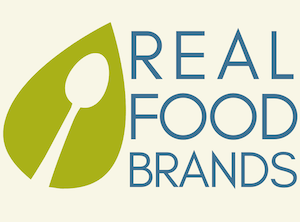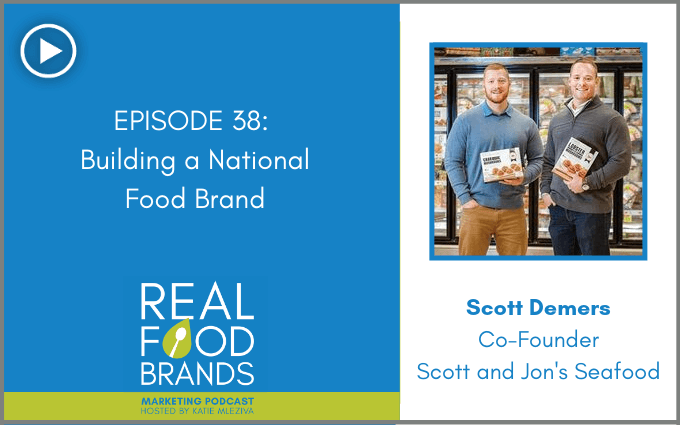One of the most frequently asked questions is how to scale a business into a national brand. The answer definitely requires more than one podcast episode, but today we have an opportunity to talk to a food company founder who has done it and hear the lessons he’s learned along the way.
Today on the Real Food Brands Podcast, host and Brand Strategist Katie Mleziva sits down with Scott Demers, co-founder of Scott & Jon’s premium frozen seafood meals. We learn how the brothers made the decision to leave their jobs to launch their business and start their journey to becoming a national brand.
Learning by Trial and Error
“We’ve been at this for a while,” Scott says, “it’s not an overnight success story.” Scott and his brother, Jon, were living together and decided to start a business. After thought and research they ended up deciding to go into food, and started with a recipe their grandmother would make at family gatherings. “I consider having zero money upfront a blessing because it forces you to do everything yourself,” Scott says. What followed was a lot of googling, and a lot of learning by trial and error.
Aligning with Your Core Values
With their grandmother’s recipe they first built a successful seasonal, indulgent frozen appetizer brand for the holidays. Being seasonal was challenging for a number of reasons: the income was obviously uneven throughout the year, you have to resell the same customers each season, and the food was pretty unhealthy. “Most importantly, it didn’t align with our core values, and when we realized that that’s when everything changed,” Scott says.
Shifting Gears to Relaunch
There was a lot of soul-searching that went into relaunching the company. “The food business is a really tough market. It’s a business everyone wants to be in because everybody buys food and it’s really hard to identify white space in the market,” Scott says, “can we create something new that doesn’t exist?” For Scott, if you’re a small startup you need to be doing something different from the rest of the market, instead of imitating what’s already out there.
When they looked at what they had, they knew that they had a network of brokers and buyers in the seafood category who had helped them get to where they were at the moment. “We noticed that frozen entrees at that time were really ticking up as a category,” Scott says, “so we just married the world we were in, seafood, with the frozen entree category and nobody was doing it at the time.” They had spent years developing their connections—or as Katie calls it, their “unfair advantage” versus the competition—so things took off when they identified that white space they knew they could serve.
The Story Behind Building a National Brand
Scott and Jon started locally with Hannaford’s, a supermarket chain in Maine. Scott cold-called and was able to set up a meeting with the frozen food buyer, but they didn’t even know how they were going to get their packaging made let alone everything else about their distribution. Still, they got a shot. As they started to grow, they used an outsourced salesforce to supercharge their outreach with low overhead. “At first,” Scott says, “you just try to get it anywhere you can. There’s really no strategy other than, will anyone buy this?”
Scott’s advice about brokers is that it’s really important early on to find the right partners. “As an early-stage company that’s trying to gain distribution, you probably don’t want to go to a huge broker that represents the biggest lines in the country. You want to find small, regional brokers that are more likely to work with you, get excited about your product, and grow with you,” he says.
In the episode we talk more about specific strategies Scott & Jon’s uses on the national level, including rebranding from The Cheating Gourmet to Scott & Jon’s earlier this year, shelf placement in the frozen seafood category rather than frozen meals, why their marketing that focuses on the in-store experience and how getting investors helped expand their capabilities on the backend operations.
Now, let’s go shake up shopping carts!
In This Episode:
- How Scott & Jon evolved their business and brand over time.
- Why having no capital can be a gift when you’re starting out.
- Scott and Jon’s simple litmus test for deciding to rebrand.
- How the brothers identified a white space they could occupy in the frozen food category.
- Why outsourcing their salesforce worked for them.
- The connections that helped them pivot their product.
- How to find the right brokers who will grow with you.
- Why Scott obsesses over the in-store experience.
Quotes:
“I consider having zero money upfront a blessing because it forces you to do everything yourself.” – @ScottandJons
“The food business is a really really tough market. It’s a business everyone wants to be in because everybody buys food and it’s really hard to identify white space in the market.” – @ScottandJons
“We believe in doing better, across the board, in everything we do.” – @ScottandJons
“As an early-stage company that’s trying to gain distribution, you probably don’t want to go to a huge broker that represents the biggest lines in the country. You want to find small, regional brokers that are more likely to work with you, get excited about your product, and grow with you.” – @ScottandJons
Resources:


